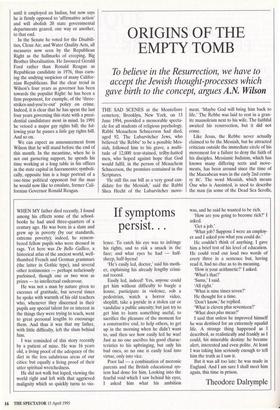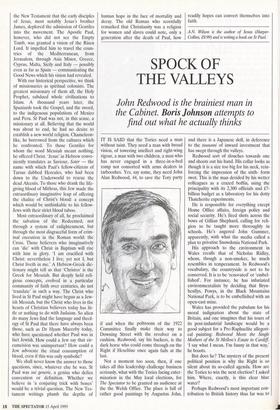ORIGINS OF THE EMPTY TOMB
To believe in the Resurrection, we have to accept the Jewish thought-processes which
gave birth to the concept, argues A.N. Wilson THE SAD SCENES at the Montefiore cemetery, Brooklyn, New York, on 13 June 1994, provided a memorable specta- cle for all students of religious psychology. Rabbi Menachem Schneerson had died, aged 92. The Lubarvitcher Jews, who believed 'the Rebbe' to be a possible Mes- siah, followed him to his grave, a multi- tude of 12,000 tear-stained, trilby-hatted men, who hoped against hope that God would fulfil, in the person of Menachem Sclmeerson, the promises contained in the Scriptures.
'He still fits our bill as a very good can- didate for the Messiah,' said the Rabbi Shea Hecht of the Lubarvitcher move- ment. 'Maybe God will bring him back to life.' The Rebbe was laid to rest in a gran- ite mausoleum next to his wife. The faithful awaited his resurrection, but it did not come.
Like Jesus, the Rebbe never actually claimed to be the Messiah, but he attracted criticism outside the immediate circle of his movement for a failure to deny the faith of his disciples. Messianic Judaism, which has known many differing sects and move- ments, has been around since the time of the Maccabean wars in the early 2nd centu- ry BC. The word Messiah, which means One who is Anointed, is used to describe the man (in some of the Dead Sea Scrolls, the men — for there could be more than one Messiah) who will rise from the dead and establish the reign of God on earth. When he comes back, the Land, promised to the Jews in the Book of Genesis, will be unambiguously theirs. (That is why many strictly Messianic Jews do not recognise the State of Israel, which is, as it were, jumping the gun of prophecy.) The Gen- tiles will recognise, and praise, the God of Israel, and it is possible that the God-fear- ers among them will be permitted, provid- ed that they submit to the dictates of the Holy Torah, a place at the Heavenly Ban- quet. The righteous will rule the world. The secular authorities, who worship false gods, or no gods at all, will be thrown down.
It is in this context that the resurrection of Jesus is to be understood. The Empty Tomb, which the disciples were believed to have discovered in that Garden in Jerusalem, was a sign that the Messianic Age had begun. They expected that it was only a matter of time, as we read in the earliest New Testament writings, before the whole structure of secular society was overthrown by the Messiah, who would come on the clouds (like the Son of Man in the Book of Daniel) to greet his elect.
We are wrong, then, whether or not we believe that Jesus rose from the dead, to suppose that it was an isolated paranormal event, such as the sighting of a UFO or the Loch Ness Monster. In order to 'believe' in it, we have to accept the Jewish thought- processes which gave birth to the concept in the first place. St Paul and the Gospel writers made it clear that the Second Com- ing would occur within their lifetime. The Empty Tomb was stage one in a process Which would herald a completely new world order. Subsequent generations of Christians have had to come to terms with the fact that the Messiah — Christ in Greek — has not yet appeared. One might expect the followers of Jew& like the inconsolable disciples of Rabbi Schneerson last summer, to be dismayed by the apparent failure of their candidate's Messiahship. Instead, when Easter Day dawns, glad bells and hymns will ring out to salute the Risen Christ.
How much the Easter faith in the Resur- rection depends on a literal belief in the Empty Tomb of Jesus will vary from believer to believer. The former Bishop of Durham, Dr David Jenkins, notoriously asserted that he did not believe in 'a con- Jurni g trick with bones', but that he did beheve in the Resurrection. One suspects that many Anglicans would say the same, finding in the Easter story a message which has nothing to do with the original Jewish understanding of what Resurrection meant. Believing where they cannot prove, like Lord Tennyson, they find in the story of Jesus 's triumph over death a myth full of consolation. Just as the earth renews itself in spring, so the human soul survives the decay of its earthly body. We read in the New Testament that the early disciples of Jesus, most notably Jesus's brother James, deplored the admission of Gentiles into the movement. The Apostle Paul, however, who did not see the Empty Tomb, was granted a vision of the Risen Lord. It impelled him to travel the coun- tries of the Mediterranean, from Jerusalem, through Asia Minor, Greece, Cyprus, Malta, Sicily and Italy — possibly even as far as Spain — communicating the Good News which his vision had revealed.
With our historical perspective, we think of missionaries as spiritual colonists. The greatest missionary of them all, the Holy Prophet, subdued whole civilisations to Islam. A thousand years later, the Spaniards took the Gospel, and the sword, to the indigenous populations of Mexico and Peru. St Paul was not, in this sense, a missionary at all. Believing that the world was about to end, he had no desire to establish a new world religion. Chameleon- like, he borrowed from the cultures which he confronted. To those Gentiles for whom the word Messiah meant nothing, he offered Christ. 'Jesus' in Hebrew conve- niently translates as Saviour, Soter — the name with which Paul's fellow-citizens of Tarsus dubbed Hercules, who had been down to the Underworld to rescue the dead Alcestis. To those who drank the life- giving blood of Mithras, this Jew made the extraordinary imaginative leap of offering the chalice of Christ's blood: a concept which would be unthinkable to his fellow- Jews with their strict blood taboo.
Most extraordinary of all, he proclaimed the salvation of the Redeemed, not through a system of enlightenment, but through the most disgraceful form of crim- inal execution in the Roman world: the Cross. Those believers who imaginatively can 'die' with Christ in Baptism will rise with him in glory. 'I am crucified with Christ: nevertheless I live; yet not I, but Christ liveth in me.' A Hebrew-Greek dic- tionary might tell us that `Christos' is the Greek for Messiah. But deeply held reli- gious concepts, evolved in a particular community of faith over centuries, do not 'translate' in such a way. The Christ who lived in St Paul might have begun as a Jew- ish Messiah, but the Christ who lives in the hearts of Christian believers today has lit- tle or nothing to do with Judaism. So alien do many Jews find the language and theol- ogy of St Paul that there have always been those, such as Dr Hyam Maccoby today, who have questioned whether Paul was in fact Jewish. How could a Jew say that cir- cumcision was unimportant? How could a Jew advocate the ritual consumption of blood, even if this was only symbolic?
We shall never know the answer to those questions, since, whatever else he was, St Paul was sui generis, a genius who defies convention or definition. Whether we believe in 'a conjuring trick with bones' would be a trivial question. The New Tes- tament writings plumb the depths of human hope in the face of mortality and decay. The old Roman who scornfully remarked that Christianity was a religion for women and slaves could note, only a generation after the death of Paul, how readily hopes can convert themselves into faith.
A.N. Wilson is the author of Jesus (Harper- Collins, £9.99) and is writing a book on St Paul.




























































 Previous page
Previous page